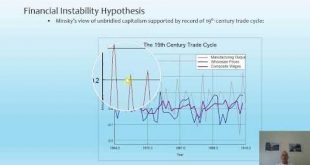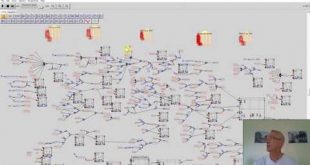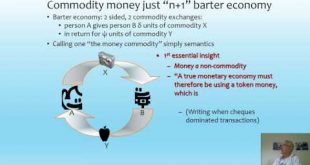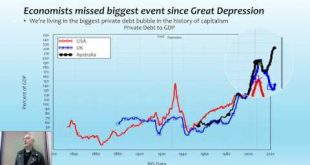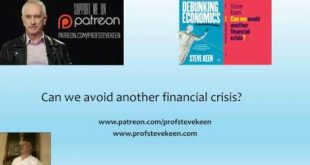This lecture models Minsky's Financial Instability Hypothesis and shows that Minsky's vision of a unstable economy emerge from a simple model derived directly from macroeconomic identities for the employment rate, the wages share of GDP, and the private debt to GDP ratio. This is the fourth of six lectures I recorded that I gave to the Exploring Economics Summer School (https://www.exploring-economics.org/en/summer-academy/details/) held just outside the city of Erfurt in southern Germany (I...
Read More »Exploring Economics Lectures 03: Minsky’s Financial Instability Hypothesis
This is the third of six lectures I recorded that I gave to the Exploring Economics Summer School (https://www.exploring-economics.org/en/summer-academy/details/) held just outside the city of Erfurt in southern Germany (I recorded all but the second lecture). The lecture explains Minsky's Financial Instability Hypothesis and models it in my system dynamics program Minsky
Read More »Exploring Economics Lectures 02: Bank Originated Money and Debt
This is the second of six lectures I recorded that I gave to the Exploring Economics Summer School (https://www.exploring-economics.org/en/summer-academy/details/) held just outside the city of Erfurt in southern Germany (I recorded all but the second lecture). The lecture continues on the topic of Bank Originated Money and Debt, and explains the macroeconomic significance of admitting the reality that banks create money
Read More »Exploring Economics Lectures 01: Bank Originated Money and Debt
This is the first of seven lectures given to the Exploring Economics Summer School (https://www.exploring-economics.org/en/summer-academy/details/) held just outside the city of Erfurt in southern Germany (I recorded all but the second lecture). The topic is the fundamental role of money in a monetary economy--which Neoclassical economics completely misconstrues by modelling capitalism as a barter system.
Read More »Can Australia avoid a financial crisis?
This was a talk I gave to the inaugural conference for the Right to Work conference in Melbourne on July 21st 2017. I cover a lot of the same topics as in recent talks, but add a focus on Australian data, which I know rather intimately from my own experience of Australia's economic and social history from the 1960s on.
Read More »Can we avoid another financial crisis Norway edition
Norway has done a lot of things right, including discovering North Sea oil of course, but unlike the UK, using that to build a sovereign wealth fund, excellent infrastructure, and a diversified industrial base. But it has also accumulated the third highest level of private debt in the world (relative to GDP), and in the last twenty years, real house prices have increased fourfold. It is one of my prime candidates for a financial crisis, which may already be commencing with decelerating...
Read More »Shutting down membership
I have recently established a Patreon site https://www.patreon.com/ProfSteveKeen, where people can support my research and advocacy work with donations starting at $1/month. That is now where I will engage in conversation in response to posts. So if anyone here wants to continue a dialogue with me and others, please sign up there. This site was flooded by a large number of spam users at the same time as I became unable to maintain my own role in discussions here,...
Read More »Brexit debate in London May 31st
I’m taking part in a debate on one of the major topics in this year’s election, Brexit, on May 31st at 7.30pm at Canham, 40 Sheen Lane, London SW14 8LW. The other speakers are Frances Coppola, and Angus Armstrong. Frances Coppola is an economic commentator in print and frequently on the BBC. Angus Armstrong is director of macro-economics at one of the top research institutions, the National Institute of Economic and Social Research founded in 1938. Click...
Read More »Meet cartoonist Miguel Guerra (& Suzy Dias) illustrator of FERIR/Reality Virus/Money cartoons
I'm working with Miguel Guerra and Suzy Dias to produce two illustrated works: one a book of satires of economists "EconComics"; and the other the Money Cartoon, financed by a Kickstarter campaign. In this video we discuss Miguel's illustrations from my paper "WHO* warns of outbreak of virulent new ‘Economic Reality’ virus" (https://www.elgaronline.com/view/journals/roke/5-1/roke.2017.01.08.xml). Miguel and Suzy's visual jokes beautifully complement my satire. The Kickstarter project has...
Read More »Freezing site/Moving to Patreon & Profstevekeen
I’m freezing this site and moving to both Patreon (https://www.patreon.com/ProfSteveKeen) and a new website http://www.profstevekeen.com/. There are several reasons: This site’s signup security failed, and something like 50,000 bot-users have signed up. It’s just too cumbersome in WordPress to delete them selectively from here, so it’s easier to move to a new, clean site; I used to be very active in discussions here, but the demands on my time became so excessive...
Read More » Steve Keen’s Debt Watch
Steve Keen’s Debt Watch


